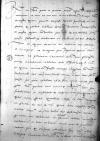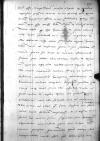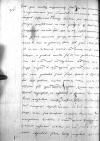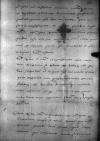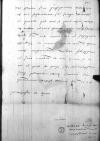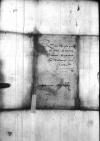Accepi ⌊⌋ Dominationis Vestrae Reverendissimae 1534-08-04⌊quarta Augusti1534-08-04⌋ mensis praesentis ad me datas, ex quibus intellexi dominum ⌊Ioannem Campensem⌋ Dominationi Vestrae Reverendissimae nonnulla, quae ille ex me audivit, ⌊⌋ subindeque materiam ei scribendi ad me dedisse.
Non eo, Reverendissime Domine, mi inficias me coram domino ⌊Campensi⌋ eo tempore, quo ille, sequens reverendissimum ⌊dominum meum⌋ ex ⌊Petricovio⌋ ⌊Cracoviam⌋, mecum uno plaustro unoque contubernio utebatur, inter confabulandum de Vestra Dominatione Reverendissima mentionem fecisse, verum id ipsum non animo traducendi aut insimulandi illam a me tum factum fuisse, sed quia optabam ab eo fieri certior, an ea, quae partim litteris, partim etiam narratis amicorum huc perferebantur de austeritate et vehementia quadam Dominationis Vestrae Reverendissimae, vera essent. Quaerebam itaque ex domino ⌊Campensi⌋, an gratia in me Dominationis Vestrae Reverendissimae retro abiisset ipsaque titulari canonicatu in ⌊sua ecclesia⌋ me destituisset, necne. Quod enim me destituerit, id didiceram primum relatu nonnullorum militarium de ⌊terra Culmensi⌋, deinde vero de quodam iuvene, qui ex ⌊Culmse⌋ attulerat ⌊huc⌋ domini olim ⌊Crapicii⌋ canonici Culmensis pecuniam in urbem ⌊Romam⌋ transmittendam.
Declaraveram etiam domino ⌊Campensi⌋ esse in ⌊terris Prussiae⌋ quosdam amicos et fautores meos, quos et ego diligerem [fa]miliarissime, et ipsi me non vulgaribus beneficiis fuerint prosecu[ti], qui a Vestra Dominatione Reverendissima se affectos iniuria nedum apud me aliosque, verum etiam apud reverendissimum ⌊dominum meum⌋ per valde lugubres epistulas suas quererentur utque, quod verum est, fatear, non dissimulavi hoc loco apud dominum Campensem me vento commiserationis impulsum iussumque etiam officio, dolori quoque meo vela dedisse, eatenus tamen, ut Vestram Dominationem Reverendissimam ne minimo quidem verbo ob hoc perstrinxerim aut quidquam de illa pronuntiaverim, quod asperum sinistrumque videretur, hoc solum in votis habens praecipuis, ut hoc, quicqui[d] esset dissidii Dominationi Vestrae Reverendissimae cum illis ipsis fautoribus et benefactoribus meis, quantum fieri posset, citissime vanesceret. Id quod fore futurum mihi summo solacio affirmabam.
Dixi item domino ⌊Campensi⌋ cedere mihi in admirationem, quod, cum ceteri ferme om[n]e[s] domini ⌊terrarum istarum⌋ consiliarii, quotiens ablegarent nuntios suos vel ad ⌊maiestatem regiam⌋, vel ad ⌊dominum meum⌋ reverendissimum, me, quem simul inservitore[m] suum esse compellarent verbis aliquot, ex quibus cognoscere possem eorum in me gratiam, sola Reverendissima Dominatio Vestra hoc genus officii a me subduceret, ex eoque conicerem non esse mihi locum aliquem in eius gratia. Verum absit, quod ego, humilis et parvae admodum sortis homo salutandi mei officium requirere in illa deberem, neque enim sum adeo expers humanarum rerum, ut nesciam, quem a quo salutari conveniat, quive sit tenor et norma istiusmodi fumi, quo totam olere aulam Vestra Dominatio Reverendissima non ignorat atque adeo multos annos experta est. Me autem eiusmodi natura finxit, ut nedum fastidiam, verum etiam horrescam salutationes et blanditias aulicas maxime frequentes, quibus plerumque vix inest mica veri affectus. Quare non putet, velim, Dominatio Vestra Reverendissima me voracem esse salutationum, cum illae stomacho meo non arrideant.
Redeo autem ad illud, quod sum fassus, me videlicet fautoribus meis dolorem impertiisse. Si Dominatio Vestra Reverendissima factum hoc meum summa sapientia sua examinare dignabitur, non dubito, quin me culpa omni vacare prorsus pronuntiabit. Quid namque aliud suscipiendum mihi esset, quam dolere una cum his, qui multis argumentis suum in me amorem comprobarunt, qui commodis et ornamentis meis numquam defuerunt, qui denique tantam sui copiam mih[i] semper praestiterunt, ut vix quispiam ex eorum consanguineis minus quam ego in eis desideraverit. N[on] dico, quod non amarem quoque Dominationem Vestram Reverendissimam, que[m] revera et amo, et plurimi facio, sed, quia illis ius est in me veterioris amoris, non licuit mihi meme[t] retexere et, quibus multa sum de me pollicitus, una cum eis vicem eorum non deplorare. Quod vero non scripsi umquam Dominationi Vestrae Reverendissimae, quinam sint illi, qui eam querelis suis sunt exsecuti, id consulto feci meo iudicio. Malui namque intra saepta sil... consistere, quam ignem ardentem exagitare.
Quare rogo Dominationem Vestram Reverendissimam impensius, ut institutum et factum hoc meum boni consulere mihique, quod iussus officio de illa cum domino ⌊Campensi⌋ expostulaverim, ad hunc modum, uti scripsi, veniae suae beneficium concedere dignetur. Nisi compertum haberem Dominationem Vestram Reverendissimam humanas actiones affectuum arbitrio et non summa sapientia expendere solere hocque amplius esse illa non solum non difficilem, sed etiam omnibus obviam et expositam plenamque humanitate, profecto alio scribendi genere quam hoc, cui materia est pura ac sincera confessio mea, illi ad eius ⌊⌋ respondissem. Nunc, quia Reverendissimam Dominationem Vestram summa sapientia praeditam esse certo scio, malui in sinum illius, quod verum est, deponere potius, quam diverticulis et flexiloquiis litteras infarcire.
Quod Reverendissima Dominatio Vestra consanguineis meis causa mea benignam se exhibet, ago habeoque illi pro hac singulari et numquam per me merita gratia, quas exiguitas mea potest, immortales gratias. Studeboque illi hoc eius beneficium pro modulo virium mearum semper demereri. Id vero, quod imbecillitate mea cessaverit Dominus Deus, supplere dignetur.
Coram reverendissimo ⌊domino et benefactore meo⌋ non opus est commendare magis Dominationem Vestram Reverendissimam, quae non ignorat, quantum locum gratiae apud illum obtineat. Pro declarando tamen frequentius Reverendissimae Dominationis Vestrae in ⌊illum⌋ studio non negligam per omnem occasionem facere id, quod dignum mandatis mihi a Vestra Dominatione Reverendissima partibus fuerit.
Afflictabatur autem ⌊dominatio sua⌋ reverendissima longo tempore gravi admodum aegritudine adeo, ut vix medici ipsi furtim inter se mussantes de summa valetudinis desperaverint. Iam tamen, Deo sint gratiae, morbus ita fractus et comminutus est, ut nullos impetus eius metuamus. Brevique ⌊dominatio sua⌋ reverendissima prodibit in publicum abiecto languore, qui adhuc in membris morbo defatigatis manserat quique vanescit in dies. Quodsi, quod abominor, de ⌊sua dominatione⌋ reverendissima quidpiam tristius magisque adversum accidisset, mihi profecto negligentius vivendum fuisse[t]. Causa a nemine palpari non potest.
Quod superest, rogo, ut Vestra Dominatio Reverendissima me gratia sua prosequatur, habitura ex me inservitorem sibi semper benevolum et paratum. Qui etiamsi, quod absit, aversari vellem ab eius gratia, certe auctoritas reverendissimi ⌊domini mei⌋ cogeret me ad suscipienda augendaque ea omnia, quae a Vestra Dominatione Reverendissima mihi imperarentur.
Valeat felicissime cum suis omnibus Dominatio Vestra Reverendissima et de me id, quod de quoque sibi devinctissimo, semper polliceatur.
